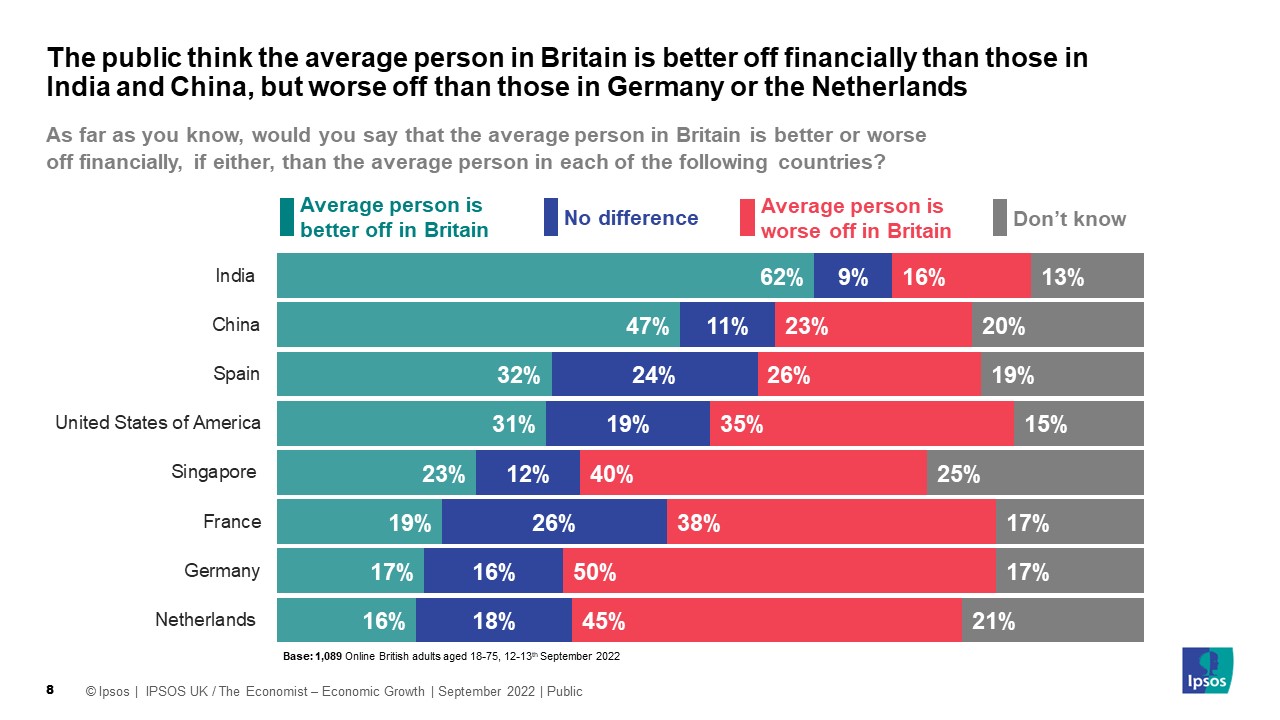New research finds public support economic growth, but not at any cost
New research by Ipsos for the Economist finds that half of people (49%) agree that economic growth does more good than harm, whilst 17% state the opposite.
However, growth is not supported at any cost, especially if it is at the cost of countryside and environment.
- For example, 57% of people agree when planning new housing, ‘priority should be given to the views of local residents or protecting the countryside even if less housing is built’. While only 24% of people agree that ‘when planning for new housing, priority should be given to building as many new homes as possible’.
- In a similar vein, 43% of people say ‘More focus should be placed on protecting the environment, even if that harms economic growth’, compared to 29% of people that say ‘More focus should be placed on economic growth, even if that comes at the expense of protecting the environment’.
In addition, a majority of people (53%) feel that the Government should spend more on healthcare and pensions, even if it means spending less on infrastructure and science, whilst 16% think the reverse should happen.
The public are split when it comes to immigration and how much they are willing to open up the country in the interests of growth. While 38% of people say we should allow as much immigration as the economy needs to grow, a similar proportion (39%) agree that there should be strict limits on immigration, even if this harms growth. People are also split over the redistribution of wealth versus economic growth, with 39% of people prioritising redistribution and 35% prioritising growth of the economy.
Four in 10 people (38%) agree that politicians focus too much on the economic growth, compared to three in ten (28%) that say politicians don’t focus on it enough.
What does economic growth mean to people?
Half (48%) of the general public are confident that they could explain what economic growth means and a similar proportion (49%) are not confident that they could. With more men (61%) confident in their abilities to explain the concept than women (36%).
When asked what most influences the level of economic growth in Britain today, the top 5 out of 12 factors included in the poll were:
- Events outside Britain affecting the global economy, for example, war / world trade (48%)
- The British government’s economic policies (48%)
- Long term impact of the Covid 19 pandemic (40%)
- The level of taxation (36%)
- How much British workers are paid (31%)
When asked what the consequences would be if there was a significant increase in economic growth in the next 12 months, the public mainly see positive consequences. The top 4 consequences out of 11 on our list were:
- Increased wages for working people (44%)
- More jobs available (42%)
- A more positive public mood (41%)
- Government can spend more on public services (41%)
Meanwhile, negative consequences such as ‘more pressure on Britain’s infrastructure e.g. transport, housing and public services (23%) and more pollution / damage to the environment (18%) ranked 7th and 9th respectively.
A full list of scores for each question can be found in the accompanying charts below.
Finally, when asked if the ‘average person in Britain is better or worse off financially, if either, than the average person in each of the following countries?’ The public are most likely to think the average person in Britain is better off than the average person in India and China but the average person in Britain is worse off than those in Singapore, Germany and the Netherlands.

Keiran Pedley, Director at Ipsos in the UK, says:
These findings reflect a nuanced public view of economic growth. On the one hand, the public tend to think growth is a good thing and recognise the benefits in terms of jobs, pay and money for public services (as well as an improved public mood). On the other hand, the public do not want growth at all costs, especially if and when it impacts the environment, house-building, immigration levels and the redistribution of wealth.
Technical Note
Ipsos interviewed a representative quota sample of 1089 adults aged 18-75 in Great Britain. Interviews took place online between 12th and 13th September 2022. Data has been weighted to the known offline population proportions.






